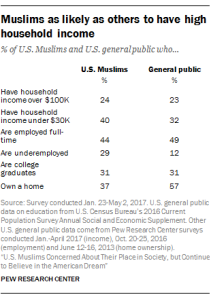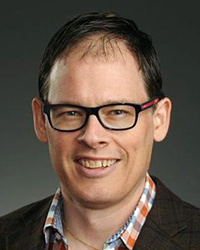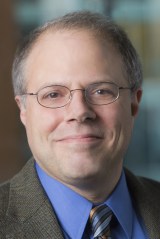Along with Roman Catholicism and Protestantism, Orthodox Christianity is one of the world’s three major Christian traditions. But unlike the other two large branches of Christianity, which have spread throughout the developing world, Orthodoxy remains largely confined to Europe.
Many majority-Orthodox countries, like Russia and Ukraine, were part of the former Soviet Union and, for most of the 20th century, were officially hostile to religion. In the more than 25 years since the collapse of the Soviet bloc, there has been an Orthodox revival in several of these countries. But many people who now identify as Orthodox Christians do not see religion as an important part of their lives, according to a new Pew Research Center report. And, particularly in former Soviet republics, many also report low levels of religious observance, such as church attendance or daily prayer.
Recently, we sat down with George Demacopolous, a professor of theology at Fordham University, to examine trends and issues in the Orthodox Christian world. Demacopolous is a noted expert on Orthodox Christian history and the author and editor of six books.
Russia is the world’s largest Orthodox country and the leader of its church is seen by many outside the country as the faith’s highest authority. Aside from its size, what, if anything, makes Russia and the Russian church special in the Orthodox world?


The Russian Orthodox Church has no theological claim to global leadership. Instead, the significance of the Moscow Patriarchate in the minds of Orthodox Christians is linked to the geopolitical significance of the Russian state. And it is especially linked to the way that the Russian president, Vladimir Putin, has embraced Orthodox Christianity as the single most distinctive feature of Russia’s cultural heritage, which he believes extends beyond the borders of Russia itself.
Putin – and by extension the Russian Orthodox Church – are popular among many non-Russian Orthodox because he has increasingly positioned the Russian government as the lone political protector of Christians in the Middle East. Moreover, he and the patriarch of Moscow are increasingly contrasting the language of “traditional values” with the secular ideologies prevalent in Western Europe and the United States. Thus, many Orthodox Christians living outside of Russia see a powerful Russia with a resurgent Orthodox Church as a positive for global Orthodoxy.
The link between Russia’s political power and the perception of the Moscow Patriarchate’s global leadership are all the more apparent when we contrast it to the situation of the Ecumenical Patriarch of Constantinople, who is the canonical leader of the Orthodox world but who suffers under constant harassment from the Turkish government and who has little real geopolitical authority.
In much of Eastern and Central Europe, most people who identify as Orthodox say religion is not important in their lives and that they don’t attend church. What explains this gap between religious identity and religious practice in much of the Orthodox world?
It is very difficult for Americans to appreciate the ways in which religion and cultural identity overlap in the Orthodox world. For most Americans, religious commitment consists primarily of a set of doctrinal faith affirmations: “I believe in this and this, but not that.” In most of the world, however, religious identity and association operate on much deeper level, with strong, community-based, cultural associations.
Being Orthodox is not so much about checking off a list of dogmatic propositions as it is being tied to local and regional culture. Thus, it would not at all be uncommon for someone in Greece or Russia to identify as Orthodox and participate in major community celebrations tied to Christianity (Easter, Christmas, Theophany, etc.) but not actually believe in the teachings of the church or, possibly, even in God.
Our polling shows that most Orthodox Christians are socially conservative on issues such as same-sex marriage and whether homosexuality should be accepted by society. In your view, does this social conservatism spring from each country’s culture or from adherence to Orthodox teachings?
While I think it is very difficult to disentangle what is cultural versus what is religious among these populations, it is also remarkable to note the variations in this data with respect to those regions that were part of the Soviet Union and those that were not. Soviet leader Josef Stalin criminalized homosexuality by tying it to pedophilia and rhetorically linked it to bourgeois licentiousness. Today, the Russian government’s promotion of “traditional values,” which is very popular among Orthodox Christians, is often juxtaposed with the idea of a godless, secular West.
To put it another way, while it is certainly true that the Orthodox Church’s positions on same-sex marriage and homosexuality are socially conservative, the distinction in the data between the former Soviet states and the rest of the Orthodox world suggests that there is more at work here than church teaching alone.
Orthodox Christians make up less than 1% of the population of the United States. At the same time, they are a diverse group that includes Russians, Greeks, Armenians, Ethiopians and others. How do these different groups relate to each other? Is there a sense of unity, or do they largely operate independently of each other?
Globally, there are 15 self-governing churches among the Eastern Orthodox, while the Oriental Orthodox, including the Copts, Armenians, Ethiopians and Assyrians, have their own churches. Most of the denominations in both groups have institutional churches in the U.S., with the Greek Orthodox Church being the largest. (The Orthodox Church of America, a 1970s offshoot of the Moscow Patriarchate, is the second largest.)
While these communities do operate independently of one another, there has been movement toward greater coordination among the Eastern Orthodox churches through the creation of the Assembly of Canonical Bishops, consisting of more than 50 members. While the assembly is moving rather slowly with respect to resolving jurisdictional overlap and other issues, they have managed to issue joint statements on matters of current concern. Most recently, for example, they issued a condemnation of racism in light of the events in Charlottesville, Virginia.
Our polling shows that many Orthodox Christians are lukewarm toward Pope Francis and the Roman Catholic Church. Nearly 1,000 years after the Great Schism of 1054 divided the Christian world into Catholic and Orthodox spheres, what is still causing this lack of closeness between these two Christian traditions?
There are theological issues that continue to divide Orthodox and Catholics, with the question of papal authority being the most significant. But the break between Orthodox and Catholics in the Middle Ages was about more than theology. It also reflected political, cultural and economic shifts that were often grafted onto theological debates.
The medieval Crusades, especially, transformed the relationship between Christian East and Christian West through the creation of a series of small colonial states in the Levant that were subservient to Western powers and which led to an enormous theft of both material and religious treasure. This dynamic continued, albeit in new ways, during the period of Ottoman Turkish rule over many Orthodox lands in the Balkans and Eastern Europe. During this time, the Orthodox were forced to turn to Western Christians as a kind of lifeline for printing and education, which were barred by the Turks.
In the 19th and 20th centuries, when emergent nation-states in Eastern Europe sought to break free of the Ottoman yoke, they largely aligned with Western European colonial forces, but there remained voices within Orthodox nations that were reluctant to associate themselves with Western power. As a result, Orthodox identity has at least partly been defined in opposition to Western Christianity. So even if an Orthodox Christian might have a positive view of a figure like Pope Francis, it is very difficult for them to comprehend an Orthodox church that is not, at least in some way, contrasted with the Roman Catholic church.
